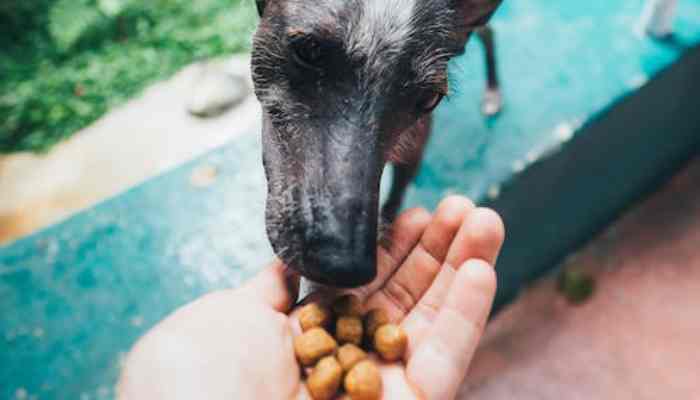As our beloved pups age, their bodies undergo various changes, including those in their digestive systems. Senior dogs are more prone to digestive issues such as decreased nutrient absorption, slower gut motility, and changes in their gut microbiome. This can lead to health problems, including malnutrition, constipation, diarrhoea, and vomiting. As pet parents, it’s important to understand these age-related changes and adapt our dogs’ nutrition to support their digestive function. In this article, we’ll cover the key points to consider when adapting nutrition for senior dogs to help keep them healthy and happy in their golden years.
I. Age-Related Changes in Canine Digestion
Dogs’ digestive systems alter as they age, which may have an impact on their general health and welfare. Understanding these alterations is essential to modifying your dog’s diet to support digestive function as they age. One of the most significant changes is a decrease in the digestive system’s efficiency, resulting in reduced nutrient absorption. This means that senior dogs may not be able to extract as many essential vitamins, minerals, and nutrients from their food as they could in their younger years. As a result, they may become malnourished despite eating the same amount of food.
Another common issue in senior dogs is decreased gut motility, which means that their intestines move food through more slowly than they used to. This can lead to constipation, bloating, and other gastrointestinal issues. Furthermore, the gut microbiome, or the community of bacteria living in the digestive tract, also changes as dogs age. This can result in an imbalance in the gut’s bacterial population, which can cause inflammation and other digestive issues.
When choosing their diet, elderly dogs should take these adjustments into account to assist their digestive health. Providing them with high-quality, easily digestible protein sources, such eggs, fish, or lean meats, can assist to ensure that they are receiving the right nutrients. In order to maintain regularity and avoid constipation, it’s crucial to choose foods that have a suitable amount of fibre.
Additionally, pet parents can support their dogs’ gut microbiome by introducing prebiotics and probiotics into their diets. Prebiotics are non-digestible food ingredients that support the growth of beneficial bacteria in the gut. On the other hand, probiotics are live microorganisms that can also help restore the gut’s natural bacterial balance.
II. Adapting Nutrition for Senior Dogs
Adapting your senior dog’s nutrition is key to supporting their digestive function and overall health. Here are some tips to keep in mind:
Consider a Senior Dog Food Formula: Many pet food brands offer senior dog formulas that are specially formulated to meet the nutritional needs of older dogs. These formulas are typically lower in calories and higher in fibre, which can help support digestive health.
Increase Fimber Intake: As mentioned earlier, senior dogs require more fibre to maintain regularity and support gut health. You can increase your pup’s fibre intake by incorporating fibrous vegetables like pumpkin, carrots, or sweet potatoes, or feeding a high-quality senior dog food that contains additional fibre.
Incorporate High-Quality Protein: Senior dogs require high-quality, easily digestible protein sources to support muscle maintenance and repair. Look for protein sources like lean meats, fish, or eggs in your dog’s diet.
Manage Fat and Calorie Intake: Older dogs are typically less active than their younger counterparts, so they require fewer calories to maintain a healthy weight. Additionally, excess fat in the diet can contribute to digestive issues, so it’s important to manage your dog’s fat and calorie intake.
Introduce Functional Ingredients: As mentioned earlier, prebiotics and probiotics can help support your senior dog’s gut health. You can also look for dog food formulas that contain other functional ingredients, like antioxidants, to support overall health and wellbeing.
Maintain Hydration: Senior dogs are prone to dehydration, which can lead to constipation and other digestive issues. Ensure that your dog has access to clean, fresh water at all times and consider feeding moist food or adding water to dry food to increase hydration.
Consider Feeding Smaller, More Frequent Meals: Older dogs may have a harder time digesting large meals, so consider feeding your dog smaller, more frequent meals throughout the day.
III. Special Considerations for Senior Dogs with Digestive Issues
In addition to adapting your senior dog’s nutrition, there are several other steps you can take to support their digestive health:
Regular Exercise: Exercise is essential for maintaining gut motility, so ensure that your senior dog gets regular physical activity. Even light exercise, such as short walks, can help keep their digestive system healthy.
Reduce Stress: Stress can contribute to digestive issues in dogs of all ages, but it can be particularly problematic for senior dogs. Reduce your dog’s stress levels by providing a comfortable, quiet space for them to rest, and minimize changes to their routine.
Regular Vet Check-Ups: Regular check-ups with your veterinarian can help identify and address any digestive issues early on. This can help prevent more serious health issues down the road.
Consider Supplements: Some supplements, like omega-3 fatty acids, can help reduce inflammation in the gut and support overall digestive health. Talk to your veterinarian about whether supplements are a good choice for your senior dog.
Avoid Table Scraps and Treats: Table scraps and treats can be high in fat and calories, which can contribute to digestive issues in senior dogs. Stick to high-quality dog food and healthy, low-fat treats instead.
Monitor Your Dog’s Stool: Pay attention to the consistency, colour, and frequency of your senior dog’s stool. This can help you identify any digestive issues early on and make dietary adjustments as necessary.
Ensure Dental Health: Dental issues can contribute to digestive issues in dogs of all ages, so ensure that your senior dog’s teeth are clean and healthy. Regular dental cleanings can help prevent dental problems and support overall digestive health.
Changing your senior dog’s diet to support their digestive system is crucial for keeping their general health and welfare as they age. You may support their gut health and avert digestive disorders by increasing their consumption of fibre, including high-quality protein, controlling their intake of fat and calories, and introducing functional substances.
Other actions, such as consistent exercise, lowering stress, routine veterinary visits, and good dental health, can also improve digestive health in addition to proper nutrition.
To choose the finest nutrition and care regimen for your furry pet, remember to consult with your veterinarian frequently. Your elderly dog can lead a healthy, fulfilling life far into old age with the appropriate approach.


